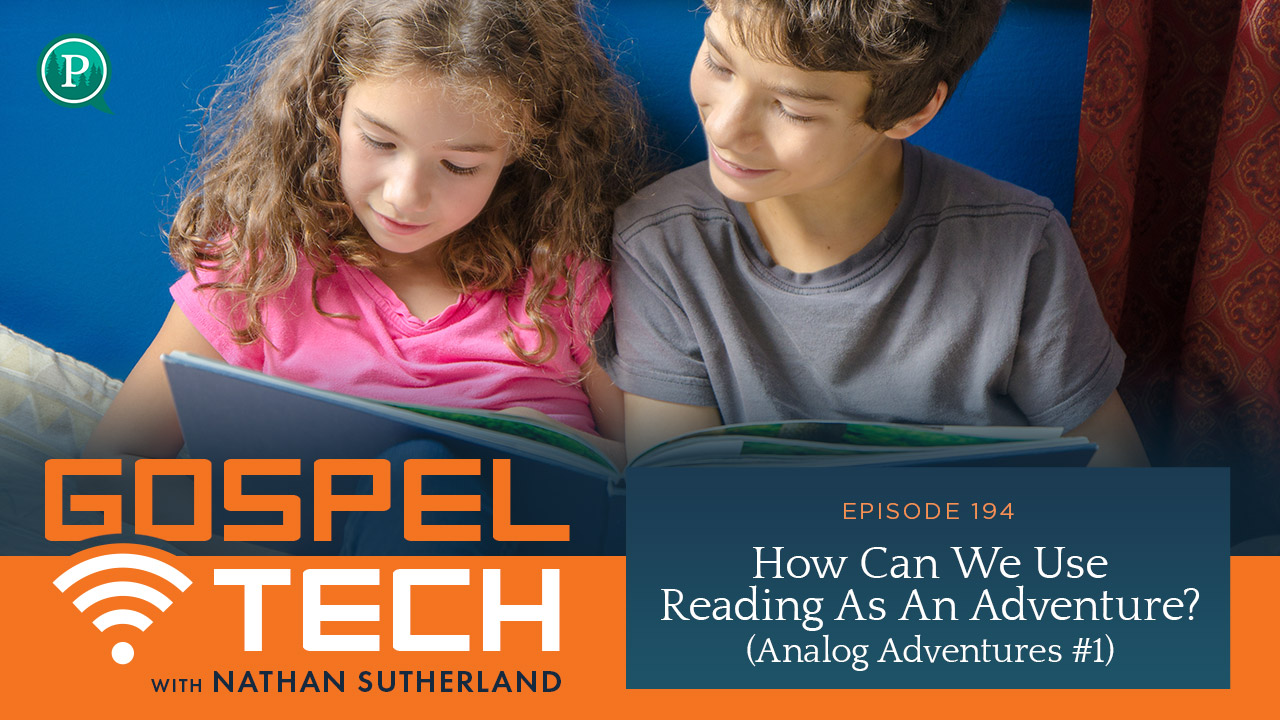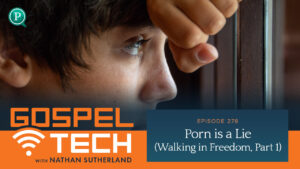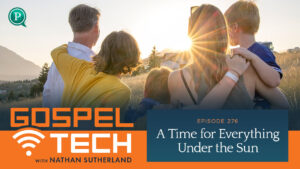How do we make real-life fun easy for our children? What can they do OTHER than their digital outlets, and how can we support making it awesome? In this series we’re looking at how to do Analog Adventures with our family. Today we talk about how to include reading and questions as part of our intentional adventures in addition to our digital fun.
Ways to tie in Reading:
- Start together
- Use audible or the Libby app (but don’t just hand libby to your kid)
- Encourage reading that excites awe, and questions, and fun stories
- TALK about what is read — both because it’s fun, it helps your child process, and it’s great for you to hear what they are getting out of it
- Make time & model — read something. It’s not a competition. Start with 5-10 minutes. Everyone sits and reads. One day a week.
How Questions Bring Awe
- Any honest question points us back to God
- Questions come from reading, and point back to it
- Questions point to how we are designed to learn
- Video games sometimes do this well, other times they manipulate our question design to trick us into more play
Show Notes:
Reading Resources:
- Read Aloud Revival, Sarah Mackenzie, @readaloudrevival
- Honey For A Child’s Heart, Gladys Hunt
Some of Our Kiddos Favorites:
- The Hobbit (audio)
- Narnia (Read Together)
- Charlie and the Chocolate Factory (audio OR read together. Yes, the British children can be rude)
- Calvin and Hobbes (Be prepared for hard questions)
- Narwhal (solo read for youngers)
Stories and Questions in Scripture
- Let the little children come unto me…(Mark 10:13-16),
- I Am the Way, the Truth, the Life… (John 14:6)
- For what can be known about God is plain to them…Romans 1:18-20, 26-32 *worth noting: 1 Cor. 6:9-11, we were such things once too!
- Matthew 13 – Jesus told stories to make the Gospel clear, just as God called Isaiah to do. The clearer the message, the more likely they are to reject it for the right reasons, receive discipline, and have a chance at repentance. (Isaiah 6:8-13)
Ways to listen:
🔗 click the link in the profile
🎧 search Gospel Tech in your favorite streaming service (iTunes, Amazon)
Transcription:
Nathan Sutherland:
Hello everyone and welcome to the Gospel Tech Podcast. My name is Nathan Sutherland and this podcast is dedicated to helping families love God and use tech.
Today, we are starting a little mini miniseries on analog adventures. This idea of what can we do to help engage in the real world and what can we do instead of some of our awesome technological outlets. I often don’t have to teach people about technological outlets. It seems like they found all the cool tech things on their own. But when we want to step away, either because it’s a remove and replace or because we’ve done a reset and we’re like, “You know what? We’re not happy with the direction this is headed, even if it’s not a problem yet,” whatever the reason might be, or you’re just someone looking for something fun to do, whatever the reason might be, analog adventures are something I need to talk about and that we need to intentionally and deliberately install into our lives because of the number of benefits, but also because of the, well, I mentioned the word intentionality that comes with them. They don’t happen by accident.
Typically, analog adventures require a little planning. Sometimes they require a little space, sometimes they require some calendar prioritizing in order to make them happen. So, analog adventures it is. Today we’re going to talk about two of them; reading and questions. They’re intimately linked, I believe, but they are going to be where we start this conversation on analog adventures, because they’re things we can start today with whatever we’ve got around us.
We can read on really any scale. You don’t have to have a full family library. You don’t have to be mom or dad of the year. You just have to be understanding the purpose of it and how you can begin to engage. So that’s where we’re going to start.
And then, the question part is another way that analog adventures, these real life adventures, pacing at the pace of our brain where we can… I personally am heavily convicted both as a teacher and a parent, where we can engage the world the way God designed us to as learners, as children. And from that, realize more about him and become more amazed with them and help our children do the same.
And so, that’s why I’m big on analog adventures. That’s going to be kind of our journey for the next couple of weeks and that’s what we’ll get started here. So with no further ado, let’s get this conversation started.
Welcome to the Gospel Tech Podcast, a resource for parents who feel overwhelmed and outpaced as they raise healthy youth in a tech world. As an educator, parent and tech user, I want to equip parents with the tools, resources, and confidence they need to raise kids who love God and use tech.
Thank you to everyone who’s helped to make this podcast possible. Thank you for listening, for sharing, for liking and subscribing, so you don’t miss any new content. And if you would be so kind as to leave a rating and a review, that would be amazing. I was just scrolling through them the other day and there was a review that was like, “Nathan is part some business entrepreneur and then non-denominational youth pastor,” and then in parentheses, “in the best way,” which I was like, “I’m going to need to chew on that. I don’t know what to make of that,” but I love that. I appreciate the feedback and the fact that that helps other people find these resources. So, thank you for sharing that if you have already. If this podcast helps you, would you leave us a rating out of five stars and then also leave us a sentence or two. It helps people find this resource.
So today, we are talking analog adventures, specifically reading and questions. And yes, I’m digging deep into my middle school language arts teacher self today. The premise of this conversation with analog adventures, as I said in the intro, is what do we do for fun when we’re trying to find something other than the stuff that’s easy fun. We don’t have to teach our kids how to have fun on social media or watching shows or playing video games, but sometimes maybe they want to do it too much, or it’s just not the right time.
Like, “Hey, you played your game and now what else do we do?” We don’t want to make it feel like punishment. We don’t want to make it to where it’s like this steep drop from what they’re actually engaged in to, “Yeah, but I said, so here’s a stick, go play in the backyard.” And they have no training or experience on how to do that. That will feel like punishment if they don’t know how to make their own fun. So how do we introduce it gently? How do we do it with them? How do we make it so the adventure in it is evident? And my argument today is that that is in fact what’s happening.
So we are going to be talking about, first, reading, then questions. Again, we’ll probably flop back and forth, but start with reading.
Reading is something we can do beginning with our youngest children. It’s incredibly important. So just on the psychology and child mental development side, reading to your child is incredible. It’s how they learn words. It’s where they get a lot of eye contact. It’s where they learn emotions in addition to watching you and the rest of the family, in addition to being around people.
Hearing stories and those interactions help young children figure out how to interact with other people, which means there are appropriate and inappropriate stories to read them, but it is important to just begin reading, letting them hear the words. Between reading to your child and having a family meal on a consistent basis, it doesn’t have to be dinner, but whatever the meal is where you guys are sitting, your children will hear a lot of words. The study I specifically have read was about dinner and it’s the children who do consistent family dinners hear a million more words by the time they’re in kindergarten. And a million more words means you’re going to have a larger vocabulary and a larger vocabulary means it’s going to be easier to read. And reading level is a direct predictor of success in other academic areas.
Now, high success in academics, let’s just be clear, is not a prerequisite for being a good person or for God loving you, but it certainly opens some doors and it certainly removes some barriers that just things aren’t as hard when you know how to read well, when you have confidence like, “You know what? I can do this. I could probably figure out how to do that too.” Reading is one of those things in our culture at this time in history that is available to us and that by reading to our children, we are giving them a great boon. So that’s my teacher argument, help their brains, help their development, remove some obstacles because God is calling them into the world and we can help equip them to be effective tools in that world.
We’re not going to ruin them for the kingdom, but we are empowering them to be used. “To those whom much is given, much is expected,” and reading is one of those muches. A high level of education, high time affluence and economic affluence, high talent and ability. All of these things are from God and we have the opportunity in certain times and space to use them well. That’s my argument.
All right, so with that in mind, how do we do it though? We’re busy, we work multiple jobs, we’re not always home, or we don’t even like books. I get it. Be that as it may, books are valuable because they operate at the pace of real life. You will not get overstimulated reading a real life book that allows you to do it with your child. Again, it builds vocabulary, it brings up questions. That’s why these two are tied together.
And it is a wonderful habit for your child to get into because when it comes to reading scripture, scripture’s an ancient text. If you’ve picked that book up recently, it’s not super easy. If we’re doing the grading level thing that we’re doing now in schools, we’re like, “Oh, this book is a three to four. This book is a seven to eight.” This thing’s a 12 plus. It’s a senior level in high school book. It is very, very difficult. Lots of metaphors, lots of illusions, lots of similes and allegories and callback references. Not only that, the syntax. The way a sentence is laid out is not easy. If you’ve ever read anything written by Paul, it’ll be like, “Paul, a servant of the Lord, to the church in,” and then you have 17 commas and it’s all one sentence, but it’s the size of a page. That is not easy to break down. So what is he talking about again and who’s he talking to?
So reading is important. We start small and you are in fact raising your child up in the way they should go because reading scripture is a gift we get that has not been available to everyone. There are entire epics of history where people could only get scripture if they showed up in a public place and listened to it read to them or someone had it memorized and they would recite chunks of it. Now, we get to engage it on our own and that’s incredible, but you can’t just pick it up and have it make sense at any point in life. Your brain has to be prepped for it.
I’m sorry, I just went right back into another teacher argument for reading. That wasn’t my goal there. My point was how can we help our children read and how can we make it not feel like punishment? The first is read it together.
So a wonderful resource for this is Mackenzie’s Read-Aloud Revival. That’s a book. Also, she has social media on Instagram, @readaloudrevival, just all one word. But she does an awesome job of helping us see how we can read well with our children. It doesn’t have to be much, like take a five-minute read and read aloud. It can be something simple. I was just trying to think off the top of my head, but whether it’s the Berenstain Bears or whether it’s something a little more intense. Actually, I’ll get to the more intense stuff later. But read aloud with your child. So you’re modeling that. If you’re doing picture books, a wonderful thing to do with a young child is read a short story. So we read Whistle for Willie or Corduroy. And two wonderful stories, one about a dog, one about a stuffed animal that is alive and wants a person.
So you read it and then you go back through. And after you’ve read it, takes you three, four minutes, and then go back through and let the child try to say the words. Like, Hadley can’t reach, she’s four, but she can tell me what’s happening on each page. And that’s super valuable both for the narrative side, like this child now understands a story, this is how a story progresses, but also for the recall and the ability to use words and recognize that she’s also telling the story, that empowerment side on the learning. Really cool.
In addition to that, when we read scripture, well, God uses a lot of stories. Once you’ve read with your child, you’ve read out loud to them, maybe they’re old enough and they can read to you, you guys can go every other paragraph or whatever.
Another option would be get some kind of audiobook engaged. We have audiobooks we only listen to in the car and then we have audiobooks the kids can listen to on their own. On their own, right now, Paddington Bear has been the regular one. It’s interesting enough that even the older boys like it, but boring enough, they can still fall asleep if we listen to it at night.
But during the day, we listen, right now we’re in the Redwall series. Just before, warned, lots of critters die in the Redwall series. I think it’s the 1990s edition of the Wingfeather Saga or one of those books. Or I guess Green Ember probably because of animals. But it’s awesome. So, we’re onto Mossflower, the second book, and the kids love it, but it’s intense, not overly so. He understands he’s writing for a younger audience, but I don’t know that that’s how someone would write today, 30 years later. I think they would adjust it. I personally appreciate that. You can go with it as you may, just be forewarned. Don’t pick it up and be like, “Whoa, that mouse just slayed a rat with a sword.” But we’ve been listening to that just in the cars when everyone’s together, and we don’t do it every single car ride, but it is a nice… They get to look forward to that story. So, listening together can be awesome.
I would encourage whatever you pick for a story, and pick something that inspires awe and wonder and questions, that brings out whatever excites your child. So starting a question list can be a great way to do this. We’ve done this especially with Owen since he was four or five, but just had tons of questions, questions about the entire world, the galaxies, the planets, the insects, the people. I mean, I’ve been asked everything from, “Where do stars come from? Why is there money? What is government? Why do bumblebees burrow in the ground?” You can go to the library and grab books on lightning storms or storms in general, which Henry is currently on a terror about storms. I was getting a list the other day in the car of all the types of storms. I learned some stuff. That’s great. But the idea is that then draws us back to the bigger questions about what caused storms. Okay, what do storms remind us about our own frailty? I mean, even in a modern world, we are very, very mortal and nothing like the power of nature reminds us of that.
So we can talk through that and then talk about, but why do these bad things happen. Many times, natural disasters aren’t things we look forward to or celebrate, so then we can have those conversations too. And we are gently working in, yes, there’s brokenness, and we’re not going to be glib and flippant with it. And even in that brokenness, we recognize the power that nature’s been instilled within, and that that can be amazing. So, look for things that cause awe in your child, certainly fiction books. Narnia does a great job of that.
My children love The Hobbit. And if you’re going to listen to a good book, listen to The Hobbit. The voice actor who does that is incredible. And you might be intimidated by fantasy books if you’re not a fantasy person, I will tell you, even Anna is into The Hobbit, because it’s the perfect archetype of the hero’s journey as far as the story told. It’s happy enough that little children can be into it. He’s funny enough that there’s jokes and parts that you’ll laugh at. Bullroarer, the hobbit forefather of Bilbo Baggins invented golf on accident during a battle. It’s very silly, but still has enough danger and intrigue to make it interesting. So, strong encouragement for The Hobbit as a side note.
So, you’re going to read together, you’re going to pick things that inspire awe. You can use a resource for that. Honey for a Child’s Heart is a wonderful resource of just books broken down by age that are generally popular with young people. There’s certainly great books beyond that, but it’s a great spot to start. I know when we were homeschooling for a year during COVID, it was a spot we went to and we were like, “What can we do between Sarah Mackenzie’s books and that book?” We got some great resources to get started. Found some avenues our children enjoyed naturally and found some ways like, “Hey,” and try this and try that.
Starting with picture books is great at all ages. And actually picture books, because they have pictures, often have a higher word difficulty. So you can read aloud to your child, your child is hearing more complex sentence structure, but can still follow because the pictures are telling the story too. It’s a valuable way to do it. So, Hot Dog was the most recent one Hadley got. It had a dog going to the ocean, a little red wiener dog. It’s a random book, but she loves it. So, pick books with pictures. That can be a great way to handle that as well.
You’re going to talk about what is read and then you are going to make time for it. Here’s two ways we’ve made time for it, maybe three. So audiobooks certainly counts. Kid is hearing words, they’re hearing stories. And it gives you a common dialogue about stories. Something like Circle Round if you like myths and folktales, can be a great option. I think we’ve only skipped two ever. It’s literally because people made deals with the devils and we’re like, “No, we’re not going to do that.” But it’s lots of folktales from all over the world. And so, it’s how the crow became black and how the bunny lost its tail and how the sun got put in the sky and all those things. So if you’re comfortable with that level of folktale and fairytale Circle Round could be great, they’re 10, 15 minutes. But audiobooks and stories is one. Reading aloud is another.
And then, the third is getting your child books that they can engage on their own, and that can be very simple stories. I would just make sure that whatever they’re reading, you at least have some gauge on what the content’s going to be. Don’t just hand them a book because they like it. And please know that absolutely we can over engage in reading to the detriment of our real lives. That is possible. It’s not typically what we see, but I have seen it, especially in teaching language arts.
I had voracious readers, I’m like, “Hey, I love that you love words so much, but this is just kind of becoming an inlet with no outlet. And you’re growing all these words and knowledge and passion, but it’s kind of turning sour and you’re actually turning in on yourself because of this passion. So let’s find a way to either start creating because of this or start sharing this with others or go out and do something that you’re inspired of because of these stories.” Let’s go spend time in the woods. Let’s go have this adventure. Let’s go hang out with friends or try that activity that you read about because simply reading there is a point where this starts to feel so safe and so comfortable that I don’t want to go out and do anything, and that’s not good either. We actually do need to be out in the world that God put us in and we just know that reading can help that. Be mindful that it is in fact helping that.
Finally, modeling it. We want to read anything. Just make sure you’re reading. Reading your Bible in front of your kids, reading your Bible with your kids. And it doesn’t have to be long, five to 10 minutes. So the last piece here is modeling it and making time. Five to 10 minutes I’ll have Owen or Henry read the Hadley before bed. That’s awesome. It gets them reading, it gets them time together, it is positive. It also frees me up to actually do the pre-bedtime stuff so I’m not sprinting back and forth between rooms. And it allows Hadley now to see that her brothers do this and it models for them.
Then, Anna and I do try to make some time to read. We have books out. We don’t read them for hours at a time. That’s just not the way our family’s currently working. But take five or 10 minutes and say, “Hey family, we’re going to read. Everyone go find a book.” We do this, man, I wouldn’t even say weekly. This happens though, especially during the summer, when people are ramped up just to 11:00, because it’s sunny all the time here in the northwest and they’re just always going. So, we’re like, “Hey, we’re going to go do some independent playtime. We’re not going to play board games right now. Go grab a book, go find a corner, and we’re going to set a timer for 10 minutes.”
And you would be amazed at what happens once you can work… Maybe you have to start with five minutes. 10 minutes might be too much, especially if your child is not used to holding their attention on an object that doesn’t give them feedback. There’s no haptics in the controller, there’s no flashing lights, there’s no sound effects telling them they’re doing a good job. There’s no level bar, there’s no experience, there’s no followers, likes, or subscribers. It can be a little underwhelming. And that’s really, really good, because as we see in scripture, where do we find the Lord? Well, we find him in the still and the quiet place. He’s not in the storm.
I want to say this carefully. The Lord is always present. He is always speaking. And when we feel like we’re not hearing from him, it’s usually because tuned him out, not because he’s turned off. And one of the ways we frequently tune him out, from the readings I do with people wiser than me, from my own personal experience, from teaching and from doing this work, frequently we find ourselves distracted and busy and we go the way… If you have Mary and Martha, we go the way of the sister trying to do so much good for God and just trying to be present and all of it. And we get caught up in the doing and we forget to be.
And that’s when we listen to Jesus’s encouragement this last couple of weeks about, “Hey, let’s take a Sabbath. Let’s step back and make space.” We can do that in little micro sabbaths of, “Hey, the next 10 minutes, we’re just going to be calm.” Maybe it’s scripture we read, maybe read it together, maybe we read it alone, but train our hearts and our minds to calm because we really don’t want to. And that might be something we even have to pray into. So that’s our first piece on reading to review. We’re going to do it together. You can do audiobooks, you can pick picture books that are at their level that you can read aloud, engage the siblings, and then model it. Let’s pick stuff where we can show them, “Hey, this is what we do as a family. This is important to us. So we’re going to just take this little amount of time.” Please, if your family can read for 20, 30 minutes, 60 minutes, go nuts. And you can do it every day, you can do it once a week.
But the idea is, know that this is an option, this is an adventure you can guide your children into and there are amazing books that will inspire conversation and questions and cool opportunities for you to engage. So please do it.
All right, now the question piece. I have been intimidated by the question piece because I’m a person who loves to have answers, but I’ve found that children’s brains are made to learn and they’ve got a lot of questions and I don’t have all those answers, which provides me the chance to do two things. One, say, “I don’t know,” and humbly be curious with them. Go, “I don’t know, let’s learn more about lightning. I remember what I was taught in elementary school, but let’s learn about it. Let’s go find a book.” Now we have an outing, now we have an invention, now we’re stepping out of our home into a public space. This is where those people who need to know Jesus live, and we’re going to go love them even in libraries. So we go and we can check out books. Books they have questions on, we can bring them home, read them together, read them independently, have them read to one another, and now we are going back and forth, and the reading inspires questions and the questions inspire more reading.
In addition to that, as an educator, I will say that I believe an honest question, a sincere question, one that you actually don’t know and you really are willing to find the answer to, that question will lead you to God more times than not. And it can be about anything. A real question about politics. A real question, not a trick question, not an argumentative rhetorical question, but a honest to goodness, “Why do we have society?” Those kinds of questions, you pull on that thread long enough, you’re going to end up at how God wired us and what he’s calling us to do, have, and be. And that is true from bumblebees and stars to society and neighbors, to any natural phenomena in between. They will inspire awe, they will inspire wonder, they will ask hard questions of us that we can then reflect on and apply to ourselves and have our children ask us as well.
And again, it can get really hard and difficult. You might have to say, “I don’t know.” There might be some questions where you’re like, “You know what? We’re not going to address that right now, but here’s a version of that.” So if they ask you about slavery, you may have to break that down to something they can understand. You may grab a biblical example and say, “Hey, you know what? This isn’t what we see in the Bible. That there was slavery and now we see…” You can run through history. By the way, look up William Wilberforce in the 1800s in England and how England managed to get rid of slavery without a war. Incredible. So there is a wonderful history to be told there.
And again, pulling that thread, go read Amazing Grace or listen to it by Eric Metaxas. It is not hard history. It’s a very narrative history. But the premise is there. The point is you can learn a story about a guy who trusted God enough to do the one faithful work. I guess, two faithful works. The other one was how do you reform society’s norms, but slavery was his main jam. That is amazing.
So I believe as an educator that as long as they’re not biased questions, “Why is my idea right? Well, let’s go look at all the research.” That’s not what we’re asking to do. I believe that God is strong enough and great enough and good enough for our children to ask real questions, for you and me to ask real questions, “God, why did this bad thing happen in my life? God, why have I not been allowed to do A, B or C? God, why have I not beaten back this piece of the flesh in me that I know you have bought and paid for and I’m new in you? What’s happening?”
God’s okay with those questions, because typically he uses those questions to ask us questions. Things like, “Do you trust me?” Things like, “Have you prayed? Have you repented? Have you done what I’ve asked you to do?” Jesus says, “If you love me, you’re going to follow my commands.” What are his commands? Love God with all you are. That’s a good spot for us all to start. Love your neighbor as yourself and then help others do the same. And he sums it all up later as just, “Love your neighbor and love one another,” in John 13.
But this idea as a real question can lead us to God. And it can be a real question in any category of learning because it’ll lead us to another question and another question and those threads we pull on, it’s how C. S. Lewis became a Christian. Any atheist who’s become a Christian, it’s become a Christian by and large because of great questions. Every once in a while, it’s a amazing grace moment, where they almost got washed over the ship with John Newton. But generally, it’s through great questions. And then crossing that and the Holy Spirit doing work not from knowledge alone, because it’s usually they didn’t learn new information. It’s them asking those questions and God revealing himself to them and them going, “Oh, okay. Well, all this information I knew before now fits in a different category.” Like, “Oh, science is still true. It just fits under a creative loving God,” and that matters.
So help your children ask great questions. Get the books and the resources to engage with them. Make the learning process and adventure because I know that I know that learning itself is the singular most exciting thing we can do. And if you [inaudible 00:24:05], if just laughed out loud listening to that, let me explain just real quick and then I’ll wrap up today’s conversation.
The reason video games are exciting is because they either actually encourage learning or they simulate learning. And I’ll be even more clear, the best games that are out there create a story that creates questions that you want to go answer. So you solve the problems and you progress the storyline because the story drives you to it, the questions drive you to it, and you’ve got to know what happens next. And they’re driving you to learning. You learn how these tools work and you learn how this environment works and you learn how the rules of the game work. And your brain’s going 100 miles an hour processing and actually learning both the rules and the outcomes of the story in this world that has been made. It’s incredibly powerful and it’s awesome. All the way back to, I mean, some of the classics, A Link to the Past, the Zelda game, one of the best storyline games, even though the graphics aren’t the best anymore, but the process of the game is incredible. So that’s one way to do it.
The other way is they simulate learning, meaning they make a bunch of arbitrary rules and they give you a bunch of carrot and sticks. So they want you to start a certain behavior. So they will penalize you if you don’t do this thing, and they’ll reward you if you do. That can be the number of games you play in Fortnite. Or if you quit a game of Fortnite early and you’re now penalized because you dropped out when your mom told you to, to go to dinner, but you left your group hanging, well, they don’t want that happening because that causes the other group to get frustrated, and they might quit now too. And now you’ve just lost players. So what do they do? Well, they’re going to ding your rank and you’re going to lose points from that.
And so, you’re learning still. The question is what are you learning? You’re not progressing a story, you’re not learning something you can apply. You’re learning how to give your time, your focus and your money to this game, so that they can make tens of billions of dollars off you. So that would be the simulated learning. I’m not going to say Fortnite is the most educational game you can play. You certainly learn in it and you get a thrill of learning every time you figure out how to do that wall a little better, every time you figure out a new combat strategy, or something else that works. That’s learning. The application is minimal. The excitement is a 10 out of 10 though. It feels really good. I would say that real life learning can feel like that.
You will not get the feedback as quick though, because frankly, reading a page takes time and then processing that information takes time and then applying it, and then when you see it all click together and you’re like, “Oh, I did the thing. I remembered that illusion or that metaphor, and I connected to another story I had or to a conversation I was having,” that kind of learning makes huge dividends and shows us how God wired us, that we are made to learn, we’re made for relationship, we’re made for connection and meaning, and that we are always looking for that. Even if we don’t have the words of, “I’m looking for God,” you are. But it may not show up. It does though when we ask real questions. It does though when we read and we engage real stories and have the conversations that come with them naturally.
So my encouragement to you this week, as you look at tool and drool tech, as you look at your RESET. Go back to the previous episodes, if you don’t know what a reset is, relationships and responsibilities, emotion, sleep, enjoyment, time. As you look at those five and say, “All right, how do I use my tech? Is it positive for my RESET or negative for my RESET?” Now, we have analog adventure go. Go, “All right, what else can we do? We can read, we can do it as a family, we can do it together, with siblings. We can model it. We can pick books that are age appropriate and that are exciting. And we can ask questions.” Start with the questions and go find the books or vice versa. But the idea here is we are making this a regular part of life, we’re making it a priority, and we can do it anywhere. Even if you’re not a reader, even if you’re not an educator, even if you don’t like books or don’t know where to begin.
Again, those two great resources, Sarah Mackenzie with the Read-Aloud Revival and Gladys Hunt with Honey for a Child’s Heart, both phenomenal. And then something from Audible, I gave you a couple of ideas, but go ask a friend. They’ll give you lots of awesome ideas. Oh, there’s also the Libby app if you want to use public libraries, at least all here in Washington. I don’t know if there’s other apps around the nation. But the Libby app is basically just the public library, rent a book for free. Just don’t give your child unfettered access to the Libby app because it’s all the books the library has in digital form, and sometimes the cover art with it. So there’s some inappropriate stuff they could bump into, and just make sure you’re having those conversations, getting them high quality read.
So, that’s it. I hope this was encouraging. I hope that you hear how you can begin today to make analog adventures in this way. If you have any questions, reach out to me, [email protected]. If you’d love more resources, you can check out the other episodes of the Gospel Tech Podcast or follow us on Instagram and Facebook at @lovegodusetech. And would you join us next week as we continue this conversation about how we can love God and use tech.
Follow this podcast:







